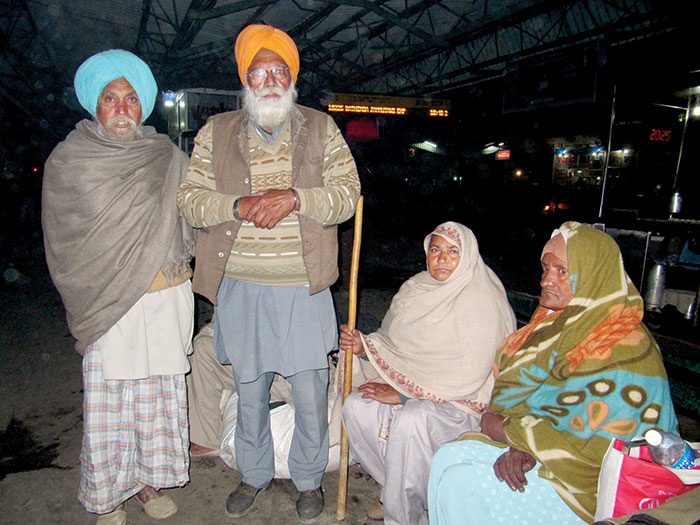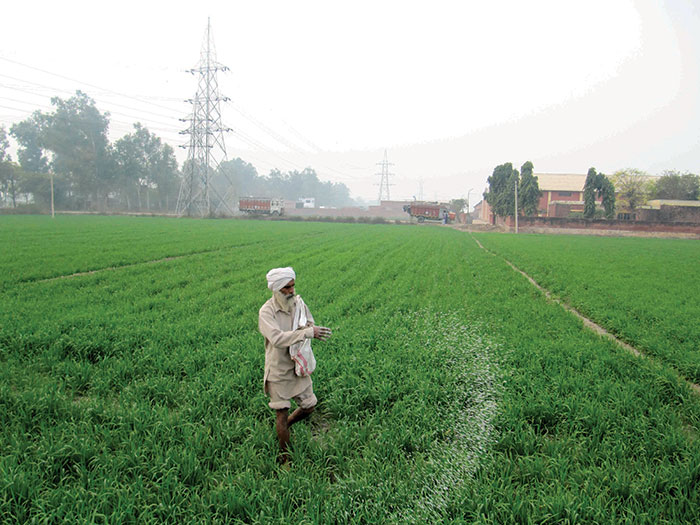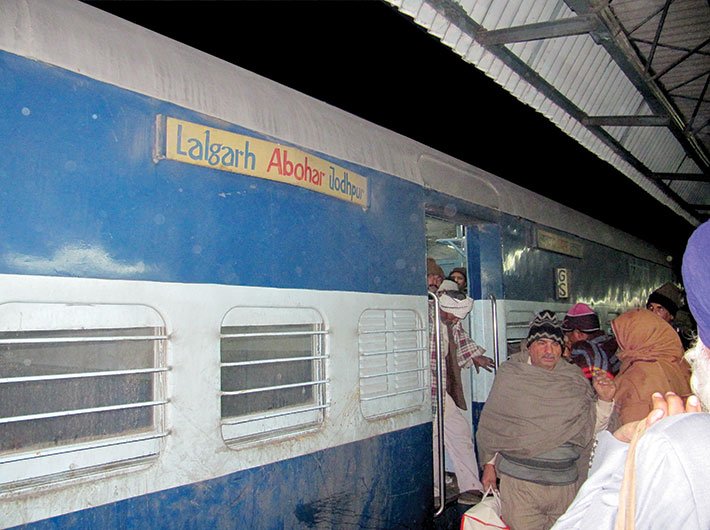This is what they call it, a very unlikely name for a train, but unfortunately the most suitable one
Even for early January, it is a cold night. A motley crowd of waiting passengers is encircled around a makeshift tea stall on the dimly-lit platform number one of Bathinda junction, in south Punjab. A while later, along with a fresh draught of icy winds, thankfully, arrives the Lalgarh-Jodhpur train. There is hardly any hustle-bustle and passengers take their seats with a practised ease. The engine lets out a shrill whistle and the train chugs off, sharp at 9.30 pm.
This is what they call here the “cancer train”, a very unlikely name for a train, but unfortunately the most suitable one. On an average, the overnight train carries around 70 cancer patients (and their attendants) daily to Bikaner in neighbouring Rajasthan for treatment. The number increases on weekends. Tonight, most passengers seem to know one another and conversations struck near the tea stall are quickly resumed.
Jal Kaur, 70, a regular on the train, is familiar with most passengers. Kaur was detected with uterine cancer a year ago. Joginder Singh, Kaur’s husband and a 72-year-old farmer from a village in district Mansa, 50 km from Bathinda, tells other passengers, “Illaj te uthe hi hai. Ethe ik Chandigarh wich haspatal hai, par oh bahut mehenga painda hai.” (The treatment is in Bikaner only. The only hospital around here is in Chandigarh but we can’t afford the treatment there.)
Singh’s village has some 300 families. Most of them are small farmers. Around 70 families have at least one cancer patient each. “All of them go to Bikaner for treatment,” he adds. According to Singh, there have been many cases in the past decade. “CM sahib ne keha si, ki cancer mareeza vaste haspatal banange, par aje tak kuch nahi hoya,” he says. (The chief minister promised that he will open a hospital for cancer patients. But nothing has happened yet.)
Gurbachan Singh nods in agreement. He is accompanying his father to Bikaner. “Eighty percent of patients there are from Punjab,” says Gurbachan, a farmer from a village on the outskirts of Bathinda. “Here we have only private hospitals with AC rooms. The expenditure is around '2,000 per day. We cannot think of getting treatment there. In Bikaner, the whole treatment, including the operation, costs us around '5,000,” he adds.
When Gurcharan’s father was detected with cancer, doctors had told him that the groundwater has uranium and that is causing cancer to many people in the Malwa region. The region, known as the cotton belt of Punjab, comprises 11 districts, including Bathinda, Faridkot, Moga, Mansa and Sangrur. Most farmers and their families here have been fighting the deadly disease and other health problems for the past decade.
Party promises
The Malwa region has 65 of Punjab’s 117 assembly seats. It has a large Sikh agriculturist Jat votebank. Traditionally it forms the base of the Akali cadre, though Punjab Congress chief and former CM Amrinder Singh too has a base here. In 2007, the region voted for the Congress, giving it 37 seats.
Amarinder Singh has promised to set up three cancer hospitals, six medical colleges and six drug de-addiction centres in the region if his party comes to power. The Akali Dal government, which inaugurated the private hospital in Bathinda last year, has also promised a government hospital for specialised cancer treatment. But experts feel opening hospital is a superficial approach and the government should ban the use of pesticides instead.
Karamjeet Singh doesn’t agree with this. “Did uranium come in our groundwater in the past decade? We didn’t have so many cancer patients before that. The surge in the number of patients is only in the past decade.” He has a point. Karamjeet was detected with the cancer a few months ago. After getting initial treatment at a private hospital in Faridkot, Singh is now going to Bikaner along with his son. It is his first visit there. Karamjeet comes from Jhoke Sarkari village in Faridkot district. The village has 10 cancer patients. Besides, there have been 15 cancer-related deaths in the village in the past five years.
Karamjeet, like most other travellers of the cancer train, is illiterate, driven by gut and common sense in most matters. For decades, their knowledge has not gone beyond the fields they have tilled. It doesn’t need to, even now. This emperor of all maladies which afflicts so many here has its roots in the lush green fields only. Experts believe, if not blame, that the green revolution of the 1960s had its own side-effects. Farmers living in the Malwa region are exposed to toxins — because of the excessive use of pesticides over the years. There is high content of cancer-causing agents in water and soil in this region. Dr GPI Singh, director and principal of Adesh institute of medical science & research in Bathinda, says most of the pesticides used here are known to be cancer-causing and the number of cancer patients is continuously rising. Dr Singh is part of a recently appointed state government team to draw an atlas of cancer patients in Punjab. It will be a cancer population-based registry of the state.
The state government has recently started a hospital in Bathinda on the private-public partnerships model. However, Dr Singh believes that is a superficial approach. “The priority should be to protect people. The government should pass legislation against the use of pesticide instead.”
Umendra Dutt from Kheti Virasat Mission, a group which has been trying to create awareness among farmers regarding sustainable agriculture, conservation of natural resources, environmental health and eco-sustainable technologies, says that lack of drinking water has become a cause of serious concern. “Water resources have become poisoned and people depend on bottled water. There are also water-related diseases in many districts,” Dutt says, adding that this has led to serious health problems, like a high rate of birth abnormalities among children and low fertility among young couples.

(R-L) Angrez Kaur and Jal Kaur along with their husbands wait for the cancer train
And yet, ahead of assembly polls, this issue is hardly discussed. In fact, the health sector has never been on the manifestos of political parties. “Political parties have other sensational issues to fight polls on. But we need to see where our health sector is headed,” says Dr Singh. There are also other problems which don’t bother politicians. For example, the agricultural economy of the state is also in crisis. Small farmers, those who have less than two hectares of land, are in serious trouble, says Sukhpal Singh, an agricultural economist from the Punjab Agricultural University in Ludhiana.
He says, “The state’s gross income might be increasing, but the income which a farmer generates is declining continuously. Unlike in the industry sector, keeping the same productivity every year is a challenge in agriculture. And today, it is constant and on the verge of a decline.” The land is getting divided within families and the number of small farmers has continuously increased. All this has contributed to about two lakh farmers keeping away from the plough in the past few years. Sukhpal Singh points out mainly two reasons for this: decreased yield and commission agents in the mandis.
Commission agents act as mediators between farmers and buyers for the marketing of agricultural produce. Farmers also depend on these agents for credit and farm supplies. For these, the agents charge them exorbitant rates of interest. A study titled ‘commission agent system in Punjab agriculture’, by a group of academicians from the Punjab Agricultural University, says that these agents have earned more than '6,400 crore on the marketing of all commodities between 1989-90 and 2009-10. The state has witnessed around 3,000 suicides in the past decade while almost 22 percent of farmers, who left farming, have become labourers, reveals the study. This perhaps has led to a sudden spurt in the number of turbaned labourers on labour chowks in Ludhiana. Earlier, mainly labourers from Uttar Pradesh and Bihar used to stand here for daily wage work.
The time is well nigh midnight now and the electric lights in the cancer train are gradually being switched off. Attendants have made beds for themselves on the floor of the coaches while patients sleep on the wooden seats. There are occasional voices — just whispers. But, somehow Angrez Kaur, 45, is not able to sleep. She was detected with breast cancer a month ago. Accompanied by her husband, who is also a farmer, she is on her second visit to Bikaner. She will have to stay there for a month now. During her last visit, one of her breasts had to be surgically removed.

A farmer working in a rice field on the outskirts of Ludhiana
Kaur is worried about her young son who is not serious about his future. She shares her concerns with Gurbachan Singh, who can empathise with her. Singh’s own young son, he rues, keeps loitering here and there all day long.
Perhaps Singh and Kaur are unaware that their concerns are shared by the entire state. Lure of foreign lands, scourge of poor education and solace of drugs have their firm grip on the state’s bewildered youth. Harpreet Kaur, a high school teacher in a government girls’ school in village Dhalian near Ludhiana, says the state’s youth don’t think beyond settling in Canada or any other foreign country. She has two sons, both settled in Canada.
Harpreet blames the trend on poor education among youth. In her own school, she adds, girls from class 8 to 10 cannot even speak their mother tongue properly. In case of boys in the village, it is even worse. “Most of them have not studied. Those who have are all unemployed and one can see groups standing at various places in the village.” The only dream, goal or ambition whatever one might call they nurture is to settle abroad. Sometimes, they find it is easy through the marriage. There have been cases in various districts where girls, who have cleared the international English language testing system (IELTS) ask for dowry to take the groom along to Australia.
Part of the blame is also on the state’s failure in generating employment back home, says Santokh Singh, a political analyst based in Ludhiana. Privatisation of higher education has resulted in mushrooming of colleges making it easier for students to gain degrees. Employment-generation, sadly, has not kept pace. Drugs have been part of the state’s history. “First, they used to take opium which came from the neighbouring Rajasthan. But now they have run out of money. So they have resorted to drug abuse. Intoxicating medicines are available over the counter at much less cost,” says Davinder Singh, a young taxi driver who is an antithesis to the state’s wayward, disillusioned youth. Twenty-something, this uneducated, yet determined young man decided to stay back in the country and work hard. A few years ago, he began driving taxi for a transport company in and outside Bathinda. Today, he has two cars of his own which he has rented out to his transport firm.
Passengers in the cancer train are mostly asleep. It is well past midnight. The train steers its way ahead through a thick layer of fog which gingerly carries a dimmed moonlight on its drooping shoulders. Inside, it is silence, but for occasional snores and coughs. Most passengers will keep journeying on this train for a long time. But, for Jal Kaur, there is hope. Last time, the doctor told her this might be her last visit since she is almost cured. Tonight, excitement doesn’t let her sleep. It is natural. Her two waking eyes wander through the carriage and rest on her husband Joginder Singh who drifts in and out of his sleep in a rhythmic synchronisation with the train’s steady movement. At times, she is worried about him. He has been exposed to those pesticides and other farm toxins for decades now. She knows his guts are not any cleaner than hers and prays for his health for whatever few years he, like her, has got to live. They don’t have kids of their own to worry about. But their village, the district and the state have many. Those very green fields they have grown up playing in and tilling are killing them. There is no escape route. Neither any plan. Nor even a mention of this in the power circles. Jal Kaur is blissfully unaware of most of these things. But she has her own vague ideas. Like, this disease is now part of their lives. A bitter harvest from their green fields they cannot refuse. Like this train they cannot avoid. In a few hours, Kaur’s journey will be over. She might not have to take this train again. But somebody in the neighbourhood will have to. The journey of the train, like the suffering of the people, will continue.
(This story appears in the February 1-15, 2012 issue)



